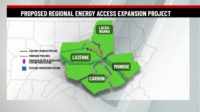Infrastructure bond issues have roared back onto statewide ballots in this year's presidential election, with more than $4 billion dollars' worth tallied in nine states, up from $1.9 billion in five states two years ago, says the National Conference of State Legislatures, or NCSL.
In addition, there are finance measures on municipal or regional ballots, particularly large ones in Texas, and initiatives that could affect how industry firms do business in some states.
In Arkansas, voters will decide whether to approve a constitutional amendment to fund $1.3 billion—the largest proposal of any state—in state and municipal road upgrades through a 0.5% sales tax for 10 years. Funds would be used to expand or improve 190 miles of four-lane highways, says a state highway agency spokesman.
Mark Lamberth, president of Atlas Asphalt Inc., Batesville, and co-chairman of the Move Arkansas Forward group that pushed the sales tax increase, says its passage "would accelerate projects that are in place but have not been done." He says the measure would support 40,000 jobs statewide, but "there's not any question out-of-state people will come in." While polls in the state this summer showed support for the tax increase lagging, "we still feel very good about this," Lamberth says.
Even so, voter opposition kept another planned highway improvement tax measure off the ballot entirely. The Arkansas Trucking Association dropped its support last year of a 5¢-a-gallon diesel-fuel tax hike, which also had legislative approval, after polls and other research showed strong opposition.
In Rhode Island, voters will weigh several bond measures totaling more than $171 million for housing, higher education and clean water projects that could boost a struggling local industry. "We are hoping for passage by the people here," says David Iwuc, executive director of the Rhode Island Associated General Contractors' chapter.
 |
First Higher-Ed Issue in 25 Years
Supporters of a $750-million bond measure in New Jersey to expand higher-education construction are equally optimistic it will get voters' blessing, although an early September Rutgers University poll showed 55% had "heard nothing" about it.
The measure is the first for higher-ed capital upgrades since 1988 to make it onto state ballots.
Paul Shelly, a spokesman for the New Jersey Association of State Colleges and Universities, says the poll also showed 56% of voters would support the measure anyway. "That's not as strong as a couple of years ago, but we'll take it in this economy," he says. If enacted, schools must provide 25% of funds for academic projects, such as classrooms and labs, that are the only ones allowed to access bond measure funds.
A student coalition that aims to sign up thousands of new college-age voters statewide has publicly supported the measure.
Shelly notes that campus sports facilities and other revenue-producing projects may gain from a state law enacted in August that will allow public-private finance ventures for the first time. However, project developers must submit proposals to state officials by next August, he says.
School construction also could boom in Texas if finance measures on ballots in Houston, El Paso and other cities pass as expected. Most of Houston's $2.7 billion in finance measures would fund educational facilities. Texas is one of the least restrictive states for getting school finance measures on ballots, according to public finance groups.
But in a Sept. 26 report, the state's top finance official warned local governments that proliferating measures could overload taxpayers with debt. State Comptroller Susan Combs said municipal debt in Texas has risen since 2001 by 126%, to $27 billion.
The California cities of San Diego and Sacramento are seeking $2.8 billion and $346 million in school bond funding, respectively, while Mesa, Ariz., has a $230-million measure on the ballot.





Post a comment to this article
Report Abusive Comment